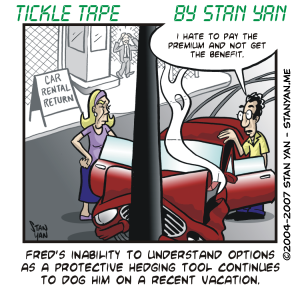Jack can’t seem to force himself to make a trade. He is just too afraid. He is afraid to lose. He wants certainty but the kind of reassurance he is seeking just can’t be found when trading the markets. He is searching for perfection, infallible knowledge, and insurance that he won’t lose, but demanding these conditions does nothing more than stifle him. He is stuck and paralyzed.
Many traders, especially novices breaking into the field, have an insatiable need to seek out certainty and security. Uncertainty represents insecurity. It’s not merely that they have a pessimistic outlook, although they have one, they equate money with psychological security. Losing money represents not only a loss of financial security but also a loss of basic emotional security and well being.
How does such an affliction develop? For many, it is rooted in early childhood. Parents often impose rules for their children to follow and punish them when the rules are broken. Young children are on the lookout for what rules to follow so as to avoid punishment and the unpleasant feelings associated with it. As adults, we make our own rules and decide to follow them or not. We no longer act as children searching for the “right” rules to follow in order to avoid punishment. Traders obsessed with perfection and certainty, in contrast, tend to search for the “right rules.”
They continuously search for rules to follow, and when no clear rules exist, they simply make them up. It’s as if their parents have followed them into adulthood. They are always there next to them nagging and threatening punishment when the “right” rules are not identified and followed unconditionally. This past childhood conflict manifests itself as searching for the “right” indicator or the “right” trade setup. And even when they see it, they have a strong need to want everything to be perfect. Because if they don’t, they are certain that some form of unspecified punishment will follow.
When your money is on the line, it’s natural to want to believe that if you just follow a specific set of rules, you’ll be safe. It’s not surprising that many people believe that life, and trading, is just a matter of following universal rules. We live in a rule-driven society.
In the typical work environment especially, we survive by following conditional statements. If I do job task X, Y, and Z, then I’ll get a big reward. The more effort I put in and the harder I work, the greater the rewards. It’s like an assembly line approach to work: I will make 100 widgets a day to earn my daily wage. Making more money is a matter of stamina and willpower. If you can force yourself to work longer hours, you’ll make more money. Such a strategy often works in white-collar jobs, as well as blue-collar jobs, and it is natural to assume that merely following if-then reward contingencies when trading leads to sure profits.
It’s tempting to think that if you just spend more time mulling over a trade, thinking long and hard enough, you’ll account for every possibility and ensure success. Similarly, if you search over and over again, you’ll find the ultimate trading opportunity. It makes sense, but it doesn’t work that way. There isn’t a direct one-to-one effort-to-payoff relation in trading. Sometimes you’ll find that following some set of rules produces a profit, but sometimes it will not. Sometimes you will find that your effort pays off nicely, but sometimes it will not.
If you want to succeed as a trader, you can’t take matters so seriously. You have to make prudent decisions, but you must also have a carefree attitude when it comes to trading. You can have high standards but don’t expect perfection. Seasoned, profitable traders are not obsessed with details. They observe the markets openly and freely and allow trades to come to them. If you can relax and accept what the markets have to offer, instead of obsessing over it all, you’ll creatively see ways of how you can profit from the market action.


